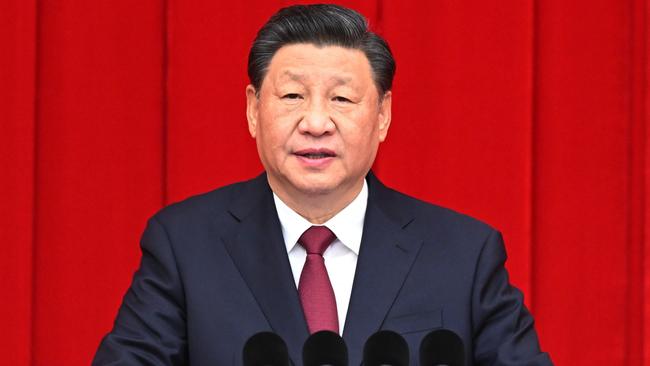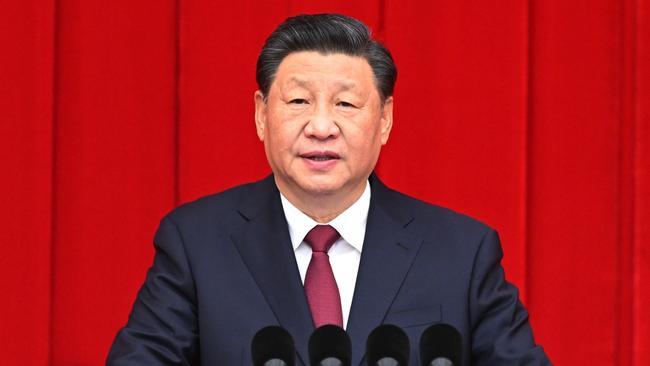‘Unprecedented’ flow of money from China as Covid-19 outbreak hits
China is in the grip of the worst coronavirus outbreak in years – and it is causing an economic bloodbath as millions are locked down.

Economy
Don't miss out on the headlines from Economy. Followed categories will be added to My News.
There has been an “unprecedented” flow of money out of China as global volatility hits the world’s second largest economy.
China is facing the most serious Covid outbreak in almost two years, with Shanghai’s 26 million residents bracing for a brutal new lockdown.
The city – one of the most economically important for the nation – has emerged as ground zero of the latest outbreak, with authorities locking down citizens in two, four-day stages in a frantic attempt to carry out mass testing and slow the spread of the virus.
During the lockdown, citizens will be prevented from leaving their homes, with both public and private transport all but prohibited and workplaces shut down.
Stream more finance news live & on demand with Flash. 25+ news channels in 1 place. New to Flash? Try 1 month free. Offer ends 31 October, 2022 >

The desperate move comes as the latest virus cluster threatens to derail China’s Covid zero strategy, which the country has been aggressively pursuing even as most of the world transitions to life with the pandemic.
But these draconic measures come with a significant cost, with China’s economy grinding to a halt as a result.

Economy battered
According to Bloomberg, almost 80 per cent of China’s economy “has been affected in some way” by the outbreak, which has been responsible for “straining the supply of commodities and posing an increasing threat to demand”.
The publication explained that the public health measures had curtailed travel, which in turn had affected fuel consumption and disrupted supply chains.
It has also caused delays in planned purchases, and affected production with employees ordered to stay home.
China’s yuan is also under pressure, according to a report issued by the Institute of International Finance.
There was a net outflow of 59 billion yuan from China through the northbound Stock Connect program with Hong Kong in the first 21 days of March.
Skittish investors are pulling money out of China on a massive scale, the South China Morning Post reports.
Foreign investors may have sold about US$15.7 billion worth of stocks in four weeks, an analysis indicates.
“Outflows from China on the scale and intensity we are seeing are unprecedented, especially since we are not seeing similar outflows from the rest of emerging markets,” the IIF report stated.
Foreign investors may be looking at China in a new light after Russia’s invasion of Ukraine, the report warned. There are fears Taiwan is at risk of military aggression from mainland China.

So far, demand for oil has plummeted, the metal industry has been brought to its knees - and the disruption of the coal sector has put imports and exports at risk.
And Shanghai is just the tip of the iceberg, with a string of other economically critical cities also being shut down or facing tough Covid restrictions this month, including technological powerhouse Shenzhen, the entire province of Jilin and the leading steelmaking city of Tangshan.
‘Spillover effect’
The escalating disaster represents a loss of billions of dollars for the world’s second-largest economy, with a report from Citi analysts earlier this month – just as the effects of the outbreak began to hit home – suggesting the impact on China’s GDP could be massive.
“Economic loss may be real this time,” the analysts stated.
“Jointly considering the spillover effect to other regions, we think the lockdown and tightened quarantine measures this round could potentially deduct ~0.5-0.8 ppt of GDP growth in Q1, assuming no policy responses.”
The analysts also claimed China’s first-quarter gross domestic product could be slashed by at least half of a percentage point, with the most impacted regions accounting for 16.7 per cent of GDP, CNBC reports.

The outlet also cited a recent report from Bank of America Securities’ China equity strategy team, which stated earlier in March that if China failed to manage the current wave, it “could cause significant downside to China’s GDP growth and disruption to the global supply chains in the near term, and potentially accelerate the decoupling and supply chain relocation in the medium term”.
‘Covid zero’ abandoned
But while China remains committed to its Covid elimination strategy – for now – more and more neighbouring states are abandoning the plan and are instead learning to live with the virus.
Hong Kong, for example, has become one of the latest to ditch the policy, after regional leader Carrie Lam said she suspected “people’s tolerance (was) fading” for life in and out of lockdown and there was a desire to return to “normal life”.
From April 1, Hong Kong residents who are fully vaccinated and Covid negative will once again be able to re-enter on flights from Australia and a handful of other countries that had previously been deemed high risk.
Many believe Hong Kong’s handling of this major transition could blaze a trail for China to follow, which could finally see the nation reopen more widely to the outside world.
Originally published as ‘Unprecedented’ flow of money from China as Covid-19 outbreak hits




